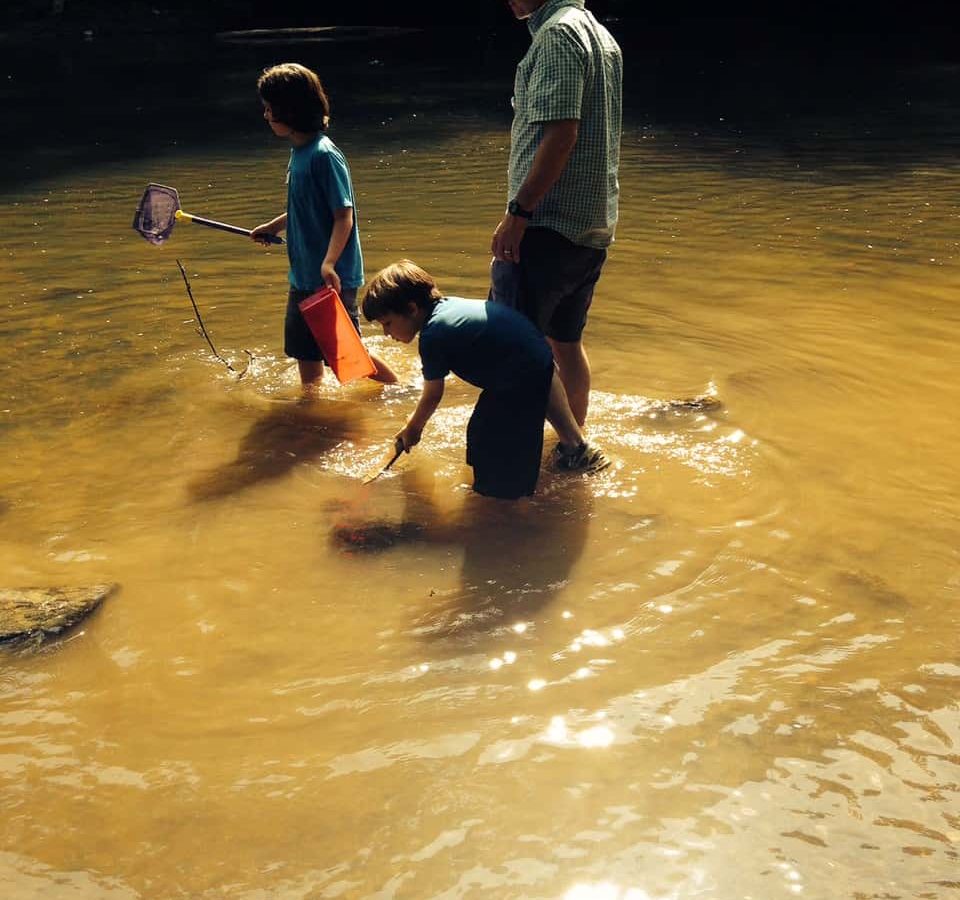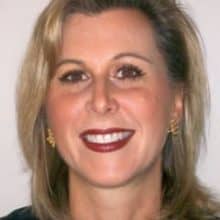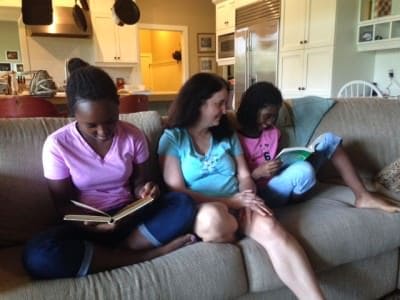

For non-public education in North Carolina, the 2013-14 school year marked an historic shift. For the first time on record, the number of homeschool students surged past the number of private school students. That enrollment gap widened in 2014-15, according to statistics released this summer by the state’s Division of Non-Public Education. Homeschool enrollments now lead private school enrollments by almost 10,000 students.
Myriad factors have propelled homeschooling to NC’s top non-public spot. But for the Nicols, a Triangle-area family new to homeschooling in 2013-14, the focus was simple: offer their two school-age sons a non-traditional learning environment.
The boys had attended an excellent local private school, says Joy Nicol, a mother of three. Still, she was drawn to the flexibility of homeschooling―the idea that she could customize an educational experience, full of outside adventures, that would allow her active boys to move freely. “They learn best in motion” is Nicol’s succinct summation of her sons’ learning style.
Now embarking on her third year of homeschooling, Nicol has created an unconventional learning program for her boys. How long will she homeschool? She isn’t sure. This year, her youngest son began attending kindergarten at a nearby private school. Her older boys may return to private school in the future, she says. But she remains grateful for the opportunity, during these years of middle childhood, to create a customized classroom. “You can do that at home,” she says, adding, “You can’t expect a teacher in a conventional classroom to do that.”
Non-public enrollment at an all-time high
How many families in North Carolina have traded private school for homeschool? It’s impossible to say.
Last year, just as homeschools set records, private schools registered an enrollment increase for the first time since the recession began. The number of students attending private schools statewide declined each school year between 2008-09 and 2013-14, but rose by almost 2 percent in 2014-15.
Perhaps the story within the story is this: total non-public enrollment, currently at more than 204,000 students statewide, is at an all-time high.
Compared to national trends, North Carolina’s non-public enrollment snapshot, in which homeschool leads private school, is an anomaly. According to the latest federal data, 4.5 million students attended private schools across the country in 2011―more than twice the estimated 1.77 million students taught at home. A recent estimate from the National Home Education Research Institute puts the number of homeschoolers nationwide at 2.2 million—a sizeable group, but still, far fewer than the number of private school students.
Private school enrollments rebounding or resilient
Certainly, financial realities have precluded some families from signing on for private school tuition. Dr. Joe Haas, executive director of the North Carolina Christian School Association (NCCSA), which represents more than 70 religious schools statewide, says enrollment in member schools last year “more or less flattened out,” largely due to the economy. This may be shifting: It’s too early in the current year for definitive enrollment numbers, says Haas, but it “seems like we are seeing a tick upwards.”
Catalysts driving growth in NCCSA’s member schools, says Haas, vary based on the market and demographics. And some schools, says Haas, are seeing enrollment gains due to the state’s Opportunity Scholarship Program.
What about independent schools? Linda Nelson, executive director of the North Carolina Association of Independent Schools (NCAIS), which represents 89 independent schools statewide, says of enrollment, “We have held pretty steady.” Nelson adds, “I don’t feel like we have lost students because of the homeschool movement.” What’s pushing more parents to homeschool? “Families are looking for options that they’re not seeing in another area,” says Nelson, adding, “North Carolina is very homeschool-friendly. The environment for homeschoolers is a much easier one to navigate than it is in many places.”
Limited access to private options
Some families in rural areas choose homeschooling because private alternatives are limited or nonexistent. More than half of NC’s 100 counties offer three or fewer private schools. Sixteen counties each feature just one private school; in 10 counties, there are no private schools at all. Almost 5,400 students are homeschooled in those counties with just one private school; almost 2,100 in counties with zero private options.
Not surprisingly, most of the state’s private schools and students are concentrated in urban areas. Mecklenburg County leads the state with more than 19,000 students, or 20 percent, of the state’s private school population. Wake County, with almost 17,000 private school students, is second; together, these two counties account for 37 percent of North Carolina’s private school students.
Collaboration on the rise
As interest in homeschooling escalates, private school leaders are mulling opportunities for partnership. This year Countryside Montessori School in Charlotte launched a program offering homeschoolers access to a la carte classes. Dr. Wilhelmenia Rembert, Countryside’s head of school, says the impetus for the program was to boost enrollment, but also, to offer an educational experience consistent with many of homeschoolers’ key objectives: “A lot of what we thought homeschoolers might be looking for, we provide. Students learn at their own pace; learning is supported in the natural ways in which they learn,” says Rembert. Initial response has been slow, but Rembert plans to keep the door open to homeschoolers.
Private-homeschool partnership is a longstanding feature of NCCSA schools. “We’ve always done that,” says Haas of collaboration. Offering homeschoolers opportunities for participation in fine arts, athletics, or testing “has always been a practice of our schools for many years,” adds Haas.
Nelson is not aware of specific private-homeschool partnerships currently operational at NCAIS schools. But collaboration is certainly on school leaders’ radar: “I do think that conversation is a pretty popular one,” says Nelson.


